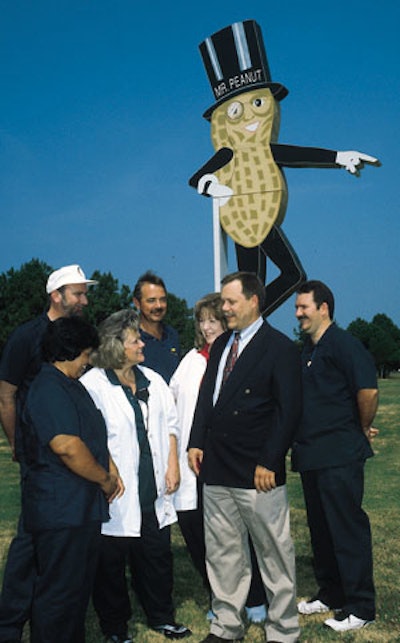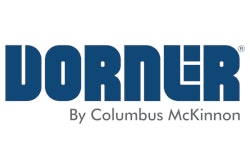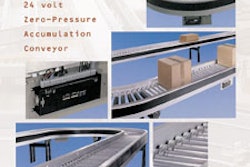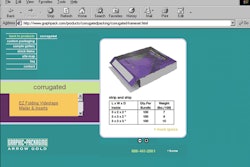At the Fort Smith, AR, facility of Planters Co., some 80 machine operators, most of them users of packaging equipment, are nearing completion of Module One in an ambitious new training program called POP, or Planters’ Operators Program. When they finish the 288-hour course, each will receive a state certificate in general industrial plant operations. Perhaps even more important, they’ll qualify for POP’s Module Two and position themselves for an opportunity to advance in rank and compensation at the plant.
When Planters, a division of East Hanover, NJ-based Nabisco, announced the new program, management figured if 20 or 30 people signed up it would be considered a success. Instead of 20 or 30, they got 90.
“The response from operators has been phenomenal,” says human resources manager April Durham. “It’s useful for a variety of operators, from forklift drivers to people who operate cookers and roasters. But of the population of operators here, probably 60 percent are in packaging, so POP has a strong packaging flavor.”
Durham describes the five basic objectives of POP this way:
•To increase the efficiency of the operation.
•To meet the demands of automation and technology.
•To increase operator contribution to the continuous improvement process.
•To provide tools for operators to build skills and increase business knowledge, thus positioning the Planters workforce to be flexible in the 21st Century.
•To foster the likelihood of internal promotions. “We love to see mechanics in our facility emerge from our own ranks rather than having to recruit from outside,” says Durham.
Before the first class met last February, great care went into the design of both POP modules.
“The first thing we did was ask ourselves what kind of skills do we want our workforce to have?” says Durham. “We arrived at our answers through a needs-based analysis that included a lot of interviews, not only with operators but mechanics, too.”
Much of this analysis was conducted by training consultant Dr. Terry Barclay, an engineer and president of Performance Solutions, Inc. (Van Buren, AR).
Day-to-day skills
“Terry was able to pinpoint what skills operators needed in day-to-day operations,” says Durham. “In addition to conducting interviews, we also evaluated job descriptions and performance evaluations to see what supervisors considered critical skills. Data and job descriptions from the U.S. Department of Labor were factored in, too. And we also sat down with four Planters operators widely recognized as high performers to get a sense of how strong they were in math, reading and language.”
Only after completing this upfront work did actual development of the curriculum begin. “Had we not done this important preliminary work, we’d have been guessing about what the curriculum should look like,” says Durham.
Another important decision made early on was to have POP take place on-site. That sets it apart from a training program for the plant’s mechanics, which takes place at nearby Westark College.
Also, as Planters worked through the curriculum development stage, Durham, Barclay and other contributors made sure the finished product was geared to adults, not 20-year-olds.
“Some adult learners get panicky when you tell them they’ll encounter algebra or English,” says Durham. “They immediately wonder, ‘What the heck do I need to know that for?’ Even though, and they sometimes forget this, they use critical math and language skills all the time out there on the packaging lines. So we tried to remain very aware of how differently adults learn, that they need to touch, to feel, to see, to interact. Simple lectures were not going to cut it.”
Why two modules?
When all the analysis had been completed, the curriculum that emerged was in two distinct industrial plant operation modules, the first for senior and the second for master certification. Graduates of the senior program are eligible for the master program.
The course modules are shown above. In Module One, attendance in the courses with asterisks is determined by how well a trainee performs on a standardized Test of Adult Basic Education. If POP participants score at a 12th- grade proficiency in these courses, they skip them. If they score below 12th grade, they work through lab tutorials designed to help them raise their scores.
Before commencing on any of the course work, trainees must sign a written “Commitment Sheet” that stipulates what Planters will provide and what is expected of trainees. That done, training begins. It’s done on the employee’s time.
Most operators at the plant work 10-hour shifts four days each week. Planters makes classes available on Tuesday and Friday. So operators who work the 6 a.m. to 4:30 p.m. shift can attend class from 5 to 7 that evening and, if they wish, from 7 to 9 as well.
Barclay describes a useful exercise that’s part of the Module One curriculum.
“Operators know more about their jobs than anyone,” says Barclay. “So we have POP trainees write down a list of things they could change that are under their control. We have them go out on the plant floor and take photos to illustrate the problem. And then we have heads of production and processing come in and have the operators give formal presentations on their recommendations for change.”
Module Two, says Barclay, gets even more ambitious.
“A lot of what’s covered is what most companies train their executives on,” says Barclay. “Issues like conflict resolution, situational leadership, group dynamics, for instance, are not often topics covered at the operator level. But we wanted operators to be exposed to these ideas. We also want operators to learn more about how management makes decisions. So we provide a course in finance, where we show in detail how costs are calculated.
“The workplace has changed so rapidly, what with just-in-time and other cost-control initiatives, that it’s hard for employees to understand why certain scheduling has to be done the way it is. We teach them to understand that it’s all about how best to respond to customers.”
Emphasis on packaging
Module Two has more in-depth packaging and packaging machinery courses. In Module One, the emphasis is on general concepts: forces and motion, work and energy, machine elements, and the use of hand tools. By Module Two, the operation and servicing of select packaging machines is emphasized. Conveyor systems and types of filling and sealing machines are also covered. Next are topics like mechanical drives, packaging materials, and set up and changeover. By the final machinery course in Module Two, trainees are looking at troubleshooting, team troubleshooting and industrial computer applications.
Durham is especially pleased at how Module One serves as a stepping stone to Module Two. And the potential for training and further advancement doesn’t stop there.
“What’s exciting about POP is the way it integrates a lot of the early principles contained in our mechanics program,” says Durham. “So if someone completes the two-year POP, that puts them into the pool of workers who are eligible for the mechanics position. It’s all about creating opportunities for yourself.”
Operating as it does in a region where the unemployment rate is at about 2%, Planters recognizes how important it is to retain good workers. POP helps significantly in this regard, and Durham isn’t done tweaking the program to see if it can become even more attractive.
“In addition to the state certificates that trainees already get from the program, we’re talking to colleges to see if these courses can become credits that count towards an associates’ degree,” says Durham.
In the end it’s all about one thing.
“The more engaged and involved employees are, the happier and more productive they are,” says Durham.






























